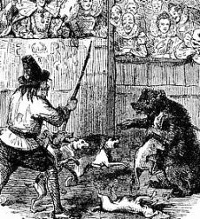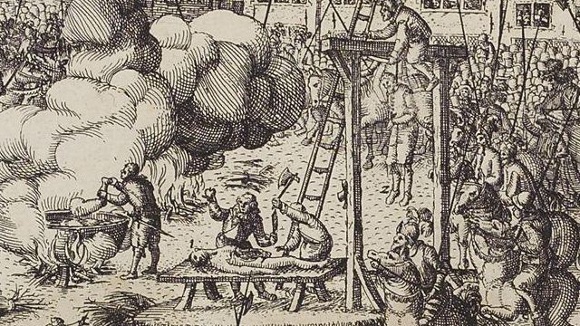King Lear Contents
- Social / political background
- Religious / philosophical background
- The Theatre
- Act I
- Act II
- Act III
- Act IV
- Act V
Act 3 scene 7
Synopsis of Act 3 Scene 7
Faced with Gloucester’s letter, Cornwall declares him a traitor worthy of punishment and tells Goneril to return home and show it to her husband, Albany. Before departing with Edmund, Goneril recommends that Gloucester's eyes should be plucked out.
Gloucester is sent for and quickly brought in, his expressions of sympathy for Lear falling on stony ground. He is bound and, with Regan’s encouragement, Cornwall gouges out one of Gloucester's eyes. He is about to put out the other eye when a servant tries to stop him. This servant is killed by Regan, but not before he wounds Cornwall. Cornwall removes Gloucester's remaining eye, and Regan tells Gloucester that it was Edmund who betrayed him. Gloucester now sees how ‘blind’ he has been to the truth and that Edgar is innocent.
Regan throws Gloucester out of his own home but the remaining servants, morally outraged by what has happened, agree to take the blinded Gloucester to the wandering madman, who can help him safely escape.
Commentary on Act 3 Scene 7
- This scene marks the climax of the Gloucester plot and is one of the most horrific scenes in all drama. The insane parody of a trial in the previous scene seems a model of rationality compared with the horror that is enacted here.
- The play so far has been full of imagery connected with sight. Here metaphor is transformed into terrifying fact as Gloucester is blinded.
- The vicious natures of Goneril and Regan are revealed as they appear to relish inflicting pain and suffering. It is left to humble servants to represent basic human decency.
show him this letter: This is the letter which Edmund showed to Cornwall. It appears to suggest that Gloucester is a supporter of the French king.
we may not pass upon his life / Without the form of justice: Although this is Ancient Britain, Shakespeare imagines it as a world that does not permit a death sentence to be passed without a full courtroom trial.
To pluck me by the beard: This would have been seen as a severe insult, especially to someone of Gloucester’s age and rank.
 I am tied to the stake, and I must stand the course: Gloucester here uses a metaphor derived from a chained animal being baited by dogs. Bear-baiting (in which a bear was chained to a post and attacked by dogs) was a popular sport in England in the sixteenth and seventeenth centuries. This reference to a notoriously cruel sport anticipates the cruelty which he is about to suffer himself.
I am tied to the stake, and I must stand the course: Gloucester here uses a metaphor derived from a chained animal being baited by dogs. Bear-baiting (in which a bear was chained to a post and attacked by dogs) was a popular sport in England in the sixteenth and seventeenth centuries. This reference to a notoriously cruel sport anticipates the cruelty which he is about to suffer himself.In his anointed flesh: The King, like a priest, is anointed with holy oil to show that he has been appointed by God to fulfil the office of King.
And quench’d the stelled fires: Gloucester says that the torment Lear suffered was so terrible that the sea would have risen up and, by doing so, would have extinguished the stars themselves.
But I shall see / The winged vengeance: Gloucester says he will see vengeance descend from the heavens on Goneril and Regan. Notice the ironic use of ‘see’ in this context, since its use precedes the moment when his eyes will be plucked from his head and he will be able physically to ‘see’ no more.
One side will mock another; the other too: Regan urges Cornwall to remove Gloucester’s other eye. She gruesomely says that the side of his face which still has an eye will mock the other which does not.
I have served you ever since I was a child: It is a servant who tries unsuccessfully to stop Cornwall. The servant may be of a lowly status in life but he still stands up against vicious amorality.
A peasant stand up thus: Regan now uses the servant’s lowly social standing as her excuse for killing him by running at him from behind with her sword.
 Out, vile jelly: It is worth remembering that members of Shakespeare's audience would have been used to seeing deeds such as this within a public context. In Shakespeare's day traitors were routinely executed by being hanged, disembowelled and having their bodies divided into four quarters – and all of this in front of an audience of spectators. Many people would have walked to Shakespeare’s Globe Theatre across London Bridge, on which the heads of traitors were displayed.
Out, vile jelly: It is worth remembering that members of Shakespeare's audience would have been used to seeing deeds such as this within a public context. In Shakespeare's day traitors were routinely executed by being hanged, disembowelled and having their bodies divided into four quarters – and all of this in front of an audience of spectators. Many people would have walked to Shakespeare’s Globe Theatre across London Bridge, on which the heads of traitors were displayed.It was he / That made the overture of thy treasons to us: To add to Gloucester’s physical suffering, Regan now adds the most intense emotional pain by showing him how Edmund, the son who he hopes is going to avenge him, is in fact the person who has brought him to this depth of pain and suffering.
Then Edgar was abused: This is an important turning point in the Gloucester plot. As soon as he loses his eyesight he begins to ‘see’ the extent to which he has been deceived and now begins to perceive the true nature of his two sons.
Women will all turn monsters: They will all become unnatural purveyors of cruelty because they will all see that Regan has committed terrible cruelty and yet her deeds have gone unpunished.
His roguish madness / Allows itself to anything: His madness makes it possible for him to do whatever he wants. Gloucester will now want to join the forces of France and Cordelia in Dover. A mad beggar in company with an old blind man will not draw any particular attention.
flax and whites of egg: Applying linen bandages soaked in egg white was a rudimentary medicine for the eye and demonstrates the care and nurture shown by the servants which counterpoints the harsh treatment delivered by Regan and Cornwall.
Investigating Act 3 Scene 7
-
In what ways does Cornwall and Regan's treatment of Gloucester highlight the destruction of order and the breaking of rules of civilised behaviour in Britain?
-
What reasons does Gloucester give to Regan for helping Lear escape?
-
How do these reasons link to the sight/blindness theme?
-
-
In what ways is this scene at the centre of the sight/blindness theme?
-
How does the blinding of Gloucester lead to his eyes being metaphorically opened to the truth about Edgar?
-
-
Cornwall’s servant is morally outraged by what happens in the scene. What is the dramatic effect of his response?
-
In this scene of disorder and contempt for civilised behaviour, how does Shakespeare maintain a sense of what is right and just?
A person whose role is to carry out religious functions.
In the Old Testament Kings and Priests were ceremonially anointed (touched with holy oil) to show that they belonged to God and as a sign of receiving God's power.
Set apart, sacred.
The Bible describes God as the unique supreme being, creator and ruler of the universe.
An Elizabethan theatre in London associated with the playwright William Shakespeare
The ‘Old’ medieval bridge spanning the River Thames in London in London the River Thames.